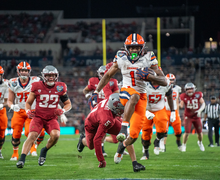Family, friends remember doctoral student for ability to inspire, motivate others
To friends and family, Joseph Hughes had an inspiring spirit that instilled values of passion, perspective and dedication.
Hughes, an English doctoral student at Syracuse University, died Saturday. Hughes, 32, had a concentration in 18th century British literature and was selected to be a Teaching Associate in SU’s English Department for the 2013-14 academic year.
His potential was the source of his lasting impression on others, said Erin Mackie, Hughes’ dissertation adviser. Hughes’ drive was to create the best version of himself, she said, and his work motivated others around him to do the same.
“After teaching the same material for decades, professors sometimes get a little jaded about our work,” said Mackie, an English professor. “Joe’s enthusiasm inspired me to realize that these books are really wonderful, interesting material. Sometimes I lose sight of that, but he would always remind me of what it’s really about.”
Last December, Hughes had taken his language exam, defended his thesis plans, and was just starting to write his dissertation, Mackie said. He was on track for his PhD, having already finished reading the hundreds of required texts and completed extensive research. His only issue was that he had researched too many chapters, and had too much material for his dissertation.
“He always did so much, whether that was with his work or expressing his fascination with it,” Mackie said. “When we’d come in for our meetings, he would talk in so much detail, it would blow us away.”
Mackie said Hughes’ conscientious and passionate personality lent him recognizable talent as a future professor. His passion translated itself when working with undergraduate students, but also when Hughes spoke of literature.
Hughes was required to have first-hand knowledge of the complicated and lengthy texts assigned in his dissertation. During meetings, Mackie said Hughes would not only recite stories, but would retell them in vivid detail, showing visible excitement.
“He was not a careerist, or an opportunist,” she said. “He was competitive with himself in that he wanted to complete his work in the best way he could, not to be better than others. There was not a thread of selfishness in him.”
Hughes loved learning and he loved teaching, said Thomas Hughes Jr., Joseph’s brother. Hughes had a fondness for using big words so much that Thomas had to sometimes reference a dictionary when talking to him.
Thomas described his brother as a bright man with a promising future.
This description resonates with many of Hughes’ colleagues, including Soumitree Gupta, a fellow English doctoral student. Gupta said she frequently ran into Hughes on campus, and usually ended up chatting about classwork, teaching and their lives.
When Gupta struggled to gather funding for her Humanities Center Fellowship, she expressed her concern to Hughes during one of their usual exchanges. She said he answered with his characteristic warm and encouraging nature.
“He assured me that my funding situation would work out and that I shouldn’t give up,” Gupta said. “Strangely, I received news that I had won the award the very next day.”
A flag has been lowered at half-staff in front of Hendricks Chapel in honor of Hughes, Thomas said. In front of the flag is a placard that describes his character, and uses many of the same positive words that Hughes himself lived by.
Said Thomas: “I just want to remind everyone that life, no matter what it throws you, is worth living. Love yourself and know that there will be ups and downs, but you’ll make it to a better day.”
Published on June 18, 2013 at 3:03 pm
Contact Annie: apalme05@syr.edu





